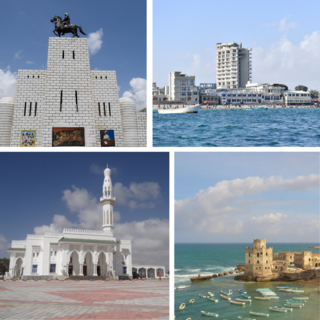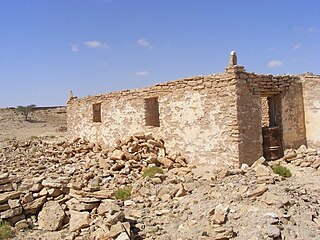
Mogadishu, locally known as Xamar or Hamar, is the capital and most populous city of Somalia. The city has served as an important port connecting traders across the Indian Ocean for millennia, and has an estimated urban population of 2,610,483. Mogadishu is located in the coastal Banadir region on the Indian Ocean, which unlike other Somali regions, is considered a municipality rather than a maamul goboleed.

Harti, meaning "strong man", is a Somali clan family that is the part of the Darod clan. The major sub-clans include the Majeerteen, Dhulbahante, Warsangali, Tinle, Maganlabe, Kaptallah and Dishiishe, while other minor sub-clans consist of Kaskiqabe, Geesaguule and Liibaangashe.

The Transitional Federal Government (TFG) was internationally recognized as a provisional government of the Republic of Somalia from 14 October 2004 until 20 August 2012, when its tenure officially ended and the Federal Government of Somalia was inaugurated.
Even before the beginning of the War in Somalia (2006-2009) there were significant assertions and accusations of the use of disinformation and propaganda tactics, classed as forms of information warfare, by various parties to shape the causes and course of the conflict. These include assertions of falsification of the presence or number of forces involved, exaggeration or minimisation of the casualties inflicted or taken, influence or control of media outlets, and other informational means and media to sway popular support and international opinion.
After two decades of violence and civil war and after the Transitional Federal Government (TFG) of Somalia captured Mogadishu and Kismayo, the TFG attempted to disarm the militias of the country in late 2006. According to the UN/World Bank's Joint Needs Assessment (JNA) coordination secretariat, "the total estimated number of militias [militia members] to be demobilized is 53,000." In 2005, they estimated that "there are 11–15,000 militia people controlling Mogadishu ."

Shabelle Media Network (SMN) is a radio and television news organization based in Mogadishu, Somalia.

Mass media in Somalia includes various radio, television, print and internet outlets. The federal government operates two official radio and TV networks, which exist alongside a number of private and foreign stations. Print media in the country is progressively giving way to news radio stations and online portals, as internet connectivity and access increases. In February 2013, the Ministry of Information, Posts and Telecommunication also launched a broad-based consultative process for the reformation of media legislation.

Omar Abdirashid Ali Sharmarke, popularly known as Omar Sharmarke, is a Somali diplomat and politician. From 2009 to 2010, he was the Prime Minister of Somalia. He subsequently briefly served as Somalia's Ambassador to the United States in 2014. In December 2014, Sharmarke was reappointed Prime Minister of Somalia. His term ended on 1 March 2017, and he was replaced by Hassan Ali Khaire.

Radio Mogadishu is the federal government-run radio station of Somalia.
Bashir Nur Gedi was the radio manager and acting director of Radio Shabelle, an independent radio station that regularly ran watchdog reports on government corruption in Mogadishu, Somalia. Gedi was murdered in 2007, though the precise circumstances of his death remains unclear. He was one of several prominent members of the station's leadership killed, including fellow acting media directors, Muktar Mohamed Hirabe and Hassan Osman Abdi. In 2007, he was the eighth journalist killed that year in Somalia.
Ahmed Abdisalam Adan, also known as Ahmed Mohamed Aden, is a Somali radio journalist, media founder and politician. He is a co-founder of HornAfrik Media Inc based in Mogadishu. In the 2000s, he also served as a Deputy Prime Minister and Minister of Public Security in the former Transitional Federal Government.
Ali Iman Sharmarke was a Somalian and Canadian journalist and philanthropist. He was a co-founder of HornAfrik Media Inc, the first independent radio network to have its headquarters in Mogadishu, Somalia. In 2007, he was killed by a roadside bomb. Sharmarke was posthumously awarded the CJFE's International Press Freedom Award and Tara Singh Hayer Award for his journalistic work. His family also established the Sharmarke Peace Foundation in his memory.

Horn Cable TV (HCTV) is a Somali news-based private television channel.
Radio HornAfrik was a radio station based in Mogadishu, Somalia. It was part of the HornAfrik Media Inc network, which also operated another radio station, a television station, a website and a training research center.
HornAfrik Media Inc, a defunct news organization based in Mogadishu, was subjected to various attacks by militants during the Islamist insurgency (2006-2009) in southern Somalia. Prior to the company's closure in 2010, these incidents included:
HornAfrik TV was a television network based in Mogadishu, Somalia. It was part of the HornAfrik Media Inc network, which also operated Radio HornAfrik, another radio station, a website and a training research center. According to MENASSAT, the Arab world media resource, HornAfrik TV during its existence operated six channels in Somali and Arabic, the two official languages of Somalia.
Capital Voice was a private radio station based in Mogadishu, Somalia. It was part of the HornAfrik Media Inc network, which also operated another radio station, a television station, a website and a training research center.







